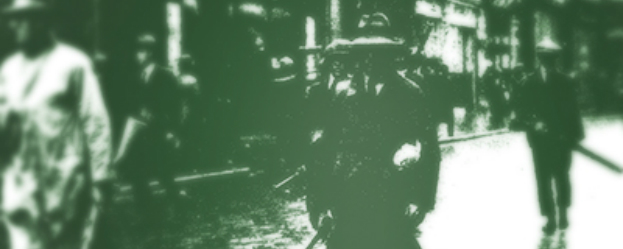This website uses cookies so that we can provide you with the best user experience possible. Cookie information is stored in your browser and performs functions such as recognising you when you return to our website and helping our team to understand which sections of the website you find most interesting and useful.
Caro Meets Theatre Interview
Christopher Bland: The Easter Rising And Thereafter
By Caro Moses | Published on Thursday 21 April 2016

Christopher Bland is better known for his business career – as chairman of the BBC, BT, and the RSC – than for his recent, more creative one. But he seems to be proving that it’s never too late: a couple of years ago, at the age of 75, he published a first novel (a second is out soon) and now he has turned his hand to the creation of a theatrical piece.
The result of his labours, ‘The Easter Rising And Thereafter’, comes to London’s Jermyn Street Theatre this week. I put a few questions to him, ahead of the impending run.
CM: The title is fairly explanatory as to the content, but can you give us some more detail about ‘The Easter Rising And Thereafter’ – what sort of a show can we expect?
CB: As you would expect from a mainly Irish cast, there is a good deal of music, poetry, and speeches. It is almost ‘the Easter Rising – The Musical’!
CM: It draws on the work of a number of prominent Irish writers, doesn’t it? How is their work incorporated?
CB: Mangan, Yeats, Landor, and MacNeice are the poets quoted, usually by way of commentary on the relevant scene. So the whole of Yeats ‘Easter 1916’ is recited as a perfect commentary on the end of the Rising sequence. And Roger Casement’s speech from the dock is recited after he is captured in Kerry and tried in London.
CM: Tell us about the songs used in the show – is it traditional Irish music?
CB: It is traditional Irish pub ballad music – Kevin Barry, the Boys of Kilmichael, the Foggy Dew, the Patriot Game, all accompanied on a range of instruments including tin whistle, violin, accordion, and drums. The cast, almost without exception, have great singing voices.
CM: What made you choose this format to explore this topic?
CB: Drama seemed an entirely appropriate medium to explore some of the most dramatic moments in recent Irish history.
CM: What made you want to cover the Easter Rising in the first place? Did you do much research into the topic, or was it something you already knew a lot about?
CB: After I published my first novel, ‘Ashes in the Wind’, I was struck by how scanty was British knowledge of Irish history between 1916 and 1923. The events during that time seem to have blurred into a single revolutionary moment at the end of which a generous Britain gave the Irish their freedom.
The truth is more complicated and more important than that, and I thought it useful to disentangle the Rising, the War of Independence, and the Civil War, and show how they related to each other. I knew quite a lot already, but research revealed some important gaps in my knowledge, in particular the chaos caused by the cancellation of the rising by McNeil on the Sunday. And I knew little about Roger Casement, who has become my new hero, both for his extraordinary work in the Congo and the Amazon basin and because of his amazing final speech from the dock.
CM: As you’ve mentioned, you’ve been writing books recently, as well as creating this, following a long career primarily in business – what inspired you to start writing?
CB: I’d always had it in the back of my mind to write; I had done a good deal of writing when a schoolboy, and then put down my pen. Going on a couple of creative writing courses got me started and resulted in the production of my first and second novels. The second, ‘Cathar’, will be published by Head of Zeus (who also published my first novel, ‘Ashes in the Wind’ two years ago) in September 2016. And I’m seeking a theme for my third book.
CM: Do you think you would like to create further pieces for the stage?
Perhaps, as it has been an exhilarating experience seeing what good actors and a great director can do to make cold words come warmly alive.
‘Easter Rising And Thereafter’ is on at Jermyn Street Theatre from 26-30 Apr. See the venue website here for more info and to book.
LINKS: www.jermynstreettheatre.co.uk | twitter.com/ceebee750






